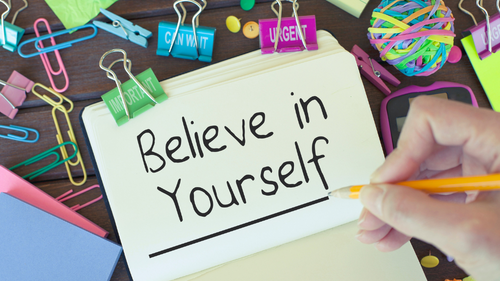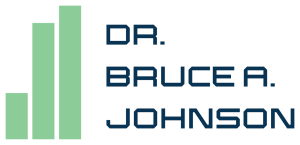Help Students Believe They Can Succeed
When someone decides to pursue their academic goals, the role of an online educator becomes more important than ever. A student needs more than a well-developed set of academic skills to sustain their progress. They could benefit from a well-defined set of beliefs about their ability to succeed. It is their instructor, the one who interacts with them through discussions, feedback, and classroom messages, who can help develop and nurture those beliefs.
To help your students develop a positive belief system, you must first understand your own beliefs about them. This means you must become aware of your own biases and anything which may interfere with the interactions you have with them. Then you must be willing to become neutral, despite any inclination you may have towards one particular view or another, and remain bias-free within the classroom. This will allow you to engage with your students about their academic progress, ascertain how you can provide guidance, and offer supportive direction which helps them develop positive beliefs. This is more challenging than it sounds, and definitely needed for students.
What an Instructor Believes About Students
It is likely you have beliefs now about the events which occurred throughout the past two years, and possibly very strong emotional feelings related to those beliefs. You may not realize how those beliefs have created biases or influenced your worldview. What matters most is your internalized belief system about students who are assigned to your classes. The following are a list of questions I use as a means of self-assessment at the start of a new class. Perhaps this will be a helpful resource for you as well.
What do I assume about students and their level of academic preparedness at the beginning of class?
What do I assume about students and their level of self-motivation at the beginning of class?
What do I assume about students and their ability to manage time at the beginning of class?
Do I hold any biases about students at the start of class, based upon their names, photos, or descriptions within their written introduction?

What an Instructor Perceives About Students
The belief system of an instructor extends beyond a worldview and biases. It also includes any perceptions and reactions you may hold and feel about learners and their requests. This is especially important as I’m finding learners are questioning their ability to succeed more than ever now, and I have to be able to understand my perceptions about their abilities. I also need to understand how I’m going to react when learners approach me with their emotional requests. The following questions are those I use to help myself better prepare for class, and perhaps this will help you as well.
Do I perceive students to be self-sufficient when they ask for help, and have valid reasons for needing my assistance, or do I perceive a request for help as something they should work out on their own?
Do I believe I can help my students by offering my time, or do I believe this is unnecessary hand-holding?
How am I prepared to address a student who feels overwhelmed, exhausted, and/or ready to give up, or do I believe this is beyond the scope of my job duties?
Do I have the disposition necessary to interact with those students who are feeling emotional?
What you believe about your students comes through with every interaction, whether it is a discussion post, feedback, email, or classroom message. There is a perceived tone which is evident in the word choice, whether or not you are aware of it. Consider the following question as a means of assessing how you view the potential of your students.
What words would you use as a general description of your students, from your observation of their ability to be successful in your class?
The answer you write will provide clues as to what you believe about your students.
There is no question every instructor is going to have a class with students who are struggling, along with students who are excelling. However, the word choice used for the question above will be in direct relation to your belief system. For example, I use words in my answer which include potential, capacity, capability, resilience, determination, and hopeful. I have learned how powerful my thoughts become when I am thinking about the students in my class, and I want to always use positive words to describe them, no matter how challenged I may feel at times to assist them.

What an Instructor Believes About Their Role
The final element of your belief system I would like for you to consider has to do with your role and how you view your tasks as an instructor. This is an extremely important element of your belief system, as it can have a positive or negative impact on all aspects of how you think and feel about your students. The following questions are those I ask of myself, especially during a busy class term, when there are many tasks I must complete. Perhaps these questions will help you as well with your own self-assessment.
What words do you use to describe your role as an instructor in the class? For example, are you a teacher who dispenses information, a facilitator who grades papers, an instructor who completes required tasks, or an educator who has many more duties?
Do you approach your instruction with ease each day you are in the classroom, or do you always feel a sense of anxiety because of never seeming to have enough time and too many requests from your students?
Here’s How to Help Students Believe They Can Succeed
This is what I ask of all educators, and it includes myself, during a time of strong emotional reactions and fears which can undermine the belief systems our students need to become successful and complete the course requirements. We, as educators, are uniquely positioned to pay attention to how our students are adapting to the classroom environment and meeting the weekly requirements, or we can simply check in and complete our weekly tasks, hoping our students somehow get through it.
As educators, we must be a source of strength and inspiration, setting aside any sense of affiliation, bias, or other preconceived ideals we hold, and create a safe space for learning to occur. When this happens within a classroom, when we are engaged in a manner which prompts learning and supports students during times when they are struggling, the result is transformative for them and for us. The following are strategies you can use to help nurture positive beliefs within your students.

Become a Champion Influencer: The length of a term may not provide enough time for you to get to know your students and the beliefs they hold to any significant extent. However, there will be clues which will become evident as you interact with them. For example, I can pick up on certain words used in their messages to me, along with the tone of their messages. It doesn’t take much to develop a sense about the student when they send a message and state they are uncertain about completing the required assignment that week, or details about their life and the challenges faced.
You are not required to offer personal advice, or take the role of a professional counselor. But what you can do is to reply and interject positive words, or words which help to influence them in a manner which supports their ongoing development and belief system. You may be the only one who interacts with them and gives them something supportive to hear or read, which makes you their champion influencer. When you can instill this sense of hope within your students, you help uplift their sense of self-motivation. This may be all they need to persist, as they continue to work on the next class assignment or task.
Teach Your Learners About Self-Development: For many students, especially non-traditional online learners, they hold negative beliefs about their ability to learn. Perhaps they waited several years between degrees before going back to school, they feel age is working against them, they perceive writing to be a significant deficit which can never be overcome, or any other number of negative beliefs. When I pick up on clues related to any of these negative beliefs, I attempt to engage these students in a conversation about self-development, and the potential or capacity for learning at any age.
What I’ve discovered is the beliefs I’ve shared above are typically related to self-limiting fears. How I help students overcome these types of beliefs is through the use of encouraging feedback. After an attempt to conduct an initial conversation with a student who I believe has this belief, I will be certain to note in the feedback each week how much progress has been made, to reinforce the message learning can and does occur. Whatever you can do to support your students, and teach them about their ability to learn, will help to support the development of a positive belief system. This can be accomplished through the words you use, whether in your communication, discussions, or feedback.
Try to See Your Learners as Individuals: As an online educator, I know it can become easy to “see” a class as a collective, rather than from an individual perspective. For example, you may tell a colleague you have a class full of challenging students. In contrast, it may become easy to judge students strictly by their names and photos, if they have elected to include one in their online profile. This is the primary manner in which you get to know your students as you log onto the classroom. Yet this is only a surface-level perspective and one which can create unintentional biases. This is also why it is important to examine what you believe and become an educator who gets to know students as individuals.
When you “see” or get to know your students as individuals, you then are better positioned to work with their developmental needs. You will have established a mindset focused on what they need to become successful, rather than viewing the class as a group to be managed. From an individualized perspective you can now watch their progress, from week to week, and gradually come to know what is working well for them, and what resources you can recommend to help support their developmental needs. You will also be establishing a productive working relationship with your students, and by doing so, you can encourage them to continue to try, learn, improve, and nurture their growth mindset.

What Learners Believe Matters
When students join your class, they each have a belief structure in place. What they believe may be effectively supporting them and their efforts in class, or it may be undermining their best intentions. You may not know until they have been making an attempt to complete course requirements and begun to interact with you through discussions and messages. No matter what your students believe, it matters as these are unspoken but well-grounded principles which are not easily changed. The belief systems each student establishes is usually the product of time and a result of many life experiences, and you may never know the origins of these beliefs either. But the impact will be felt on every attempt made and with the attitude, disposition, and actions taken.
Even a student with the most supportive set of beliefs may be challenged because of what they read or hear in the daily news, and allow negative language or thought patterns to filter into their mindset. This is where we, as educators, have an ability to help them overcome any doubts, fears, or questions they may have as they attempt to complete their academic goals. I want for us, as educators, to be more aware than ever of the need to create a nurturing and supportive environment for students, and be understanding of what they are experiencing. If we can teach them the power of their capacity to learn and grow, even during a time when life seems to be the most challenging, then they will realize more than ever the transformative power of education. When we are able to uplift our students, and teach them how to sustain positive beliefs, we are helping to instill a sense of hope within them.
About Dr. Johnson
Dr. Bruce A. Johnson has 35 years of experience teaching and training adults. The first half of his career was spent in the field of Corporate Training and Development, with his last role as Manager of Training and Development.
Then in 2005, he made a transition into the field of distance learning. Over the past 18 years, he has been an online instructor, Faculty Development Specialist, Faculty Director, Faculty Development Manager, and Dissertation Chair.
Dr. Johnson is also an inspirational author, writer, and educator. His life mission is to teach, mentor, write, and inspire others. He has earned a PhD in Postsecondary and Adult Education, a Certificate in Training and Performance Improvement (TPI), a Master’s in Adult Education, and a Master of Business Administration (MBA).
As a scholar practitioner, Dr. J was published in a scholarly journal, and he has been a featured presenter at an international distance learning conference, along with presenting at three faculty conferences. He has also published over 230 online articles about adult learning, higher education, distance learning, online teaching, and mindset development. Dr. J published three books related to higher education, including two about online teaching.
Getting Down to Business: A Handbook for Faculty Who Teach Business.
Transform Adult Education: Expert Teaching Strategies for Educators.
Transform Online Teaching: Expert Strategies and Essential Resources Every Educator Needs.
Come join Dr. J’s new group, Motivation for Transformation:
• Any time of the day, visit this group to find your source of motivation, to be inspired and more importantly, have your mindset transformed: Motivation for Transformation
Dr. J offers transformative resources
Please visit the Books page and Store page for more details.
You can also find Dr. J on the following social media sites:



